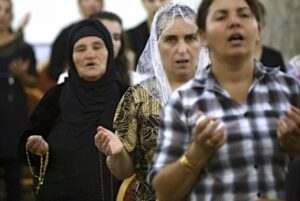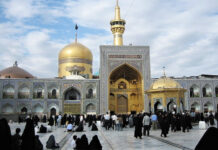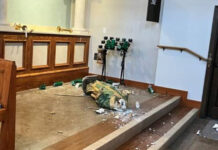
Twenty years on from the military invasion of Iraq, the country’s Christians continue to suffer from the fallout of the conflict and face persecution, marginalization and displacement while governments and the world’s media largely ignore their situation.
But precisely how did the Iraq War impact Christians, and what lessons can be learned from strategic errors that made the suffering and persecution worse for the ancient community whose presence dates back to the first century, but which has now been forced to the brink of extinction?
On March 20, 2003, a U.S.-led coalition invaded Iraq with the aim of overthrowing President Saddam Hussein and his government, primarily and ostensibly to prevent him from obtaining weapons of mass destruction (WMDs) which threatened to destabilize the entire oil-rich region.
The George W. Bush administration and its “coalition of the willing” expected a swift military campaign, followed by the installation of a democratically elected government that would bring peace and stability to the country. But “Operation Iraqi Freedom” — waged illegally according to some international authorities and executed poorly in the eyes of other critics — became a protracted conflict that cost more than 200,000 civilian and military lives, 2 trillion US dollars, and displaced 9.2 million Iraqis.
Christians and other minorities became targets of Islamist groups, such as al-Qaida, that rapidly gained a foothold in the country. Their many attacks targeted Christians, such as five churches bombed in Baghdad and Mosul in 2004, as well as the murder of clergy including Chaldean Archbishop Paulos Faraj Rahho of Mosul in 2008 — the most senior Chaldean Catholic to be killed in the Iraq War — and Father Ragheed Ganni in 2007.
After the departure of U.S. forces in 2011, an even more barbaric terrorist group, Islamic State (ISIS), an offshoot of al-Qaida, emerged as a regional power. Having already brutally attacked Iraqi Christians in 2010, in 2014 it invaded the ancient, predominantly Christian-populated areas of Northern Iraq. At its peak, ISIS managed to capture 40% of the country, most notably Mosul, home to 24,000 Christians in 2003 but now to only 350.
President Barack Obama, who oversaw the withdrawal of US troops in 2011, ordered the forces back into Iraq in 2014 as part of “Operation Inherent Resolve” in a bid to restore security. But ISIS was not defeated completely until 2018, by which time many Iraqi Christians and other minorities had been violently killed or tortured, and many more had been dispossessed and displaced, or had fled the country altogether to seek refuge in the West.
The overall consequences of the 2003 invasion “brought death to many and has nearly destroyed Iraq, saw the emergence of ISIS, and set wars off in the Middle East that continue today,” said Archbishop Bashar Warda of Erbil in northern Iraq. “It also destroyed many lives, livelihoods and forced people off to the diaspora.”
In 2003, a total of 1.3 million Christians lived in Iraq and enjoyed protection and near-equal rights with Iraq’s Muslim majority under Saddam. Now that number has dwindled to fewer than 250,000. “I have not met one person both locally and internationally who has said the 2003 military invasion was a good decision,” Archbishop Warda told the Register. “No one, except corruption, has benefited from the invasion.”
The impact of the war and its aftermath on Iraq’s Christians has led many to question whether their interests were ever seriously considered by the U.S.-led coalition. Pope St. John Paul II frequently warned, in vain, against the conflict and sent peace envoys to try to avert it, largely because he could foresee the devastating effect it would have on Christians there.
‘Massive, Massive Failure’
Christian and Yazidi minorities were either seen as “acceptable collateral damage in the long-term planning of the Iraq campaign” or they were “never accurately accounted at all,” said Stephen Rasche, an American who has served the Chaldean Catholic Church in Iraq since 2014 and was present throughout the recovery of Christian Iraq following the ISIS occupation.
“Either way this was a massive, massive failure in planning and intelligence by the Bush administration which raises very difficult moral questions — questions which have not come close to being answered by those most responsible,” Rasche told the Register. He added he was particularly disappointed by the absence when marking this anniversary of any “sincere apology or real remorse for the thousands of lives taken.”
Some commentators have traced the catastrophe inflicted on Iraqi Christians and other minorities, especially by ISIS, to at least one key decision made by the Coalition Provisional Authority (CPA), the caretaker government established in May 2003 and run by the U.S. Department of Defense: the formal disbandment of the Iraqi Army, otherwise known as CPA Order 2, on May 23, 2003 — exactly 20 years ago.
Rasche said he believes this order was “clearly a mistake” and a “major contributor to the violence which engulfed Iraq, not just from ISIS in 2014, but by other sectarian fighters from 2003 onward, which were very ugly times in many parts of Iraq.” Archbishop Warda agreed, believing the decision was a “tragedy for the country.”
The person ultimately responsible for implementing this order was Iraq’s de facto head of state at the time, Ambassador Paul Bremer, a seasoned U.S. diplomat whom President Bush appointed to run the CPA from 2003 to 2004.
Speaking to the Register May 10, Bremer defended his decision, saying that when he arrived in early May of 2003, nearly two months since the invasion, “there really was no army” as it had, in the Pentagon’s words, “self-demobilized.”
“I have often said the mistake was using the verb disband as there was nothing to disband,” Bremer explained. “The question was, should we recall the old army or should we build a new army? That was our dilemma.”
When asked if the army’s dissolution led to a power vacuum to be later filled by ISIS, Bremer said he believed such a theory was “demonstrably wrong.”
“What actually happened was, when I issued that order, we said we were going to build a new Iraqi army,” and that “anybody up to the grade of colonel could apply for a role in the new Army. And of course, the draftees could then become enlisted if they wanted to.
“And when I left Iraq 14 months later, 60% of the officers and men in that new Iraqi army were from the old Army. So, they came back, and that made the training of them easier. That army, trained by the Americans, defeated al-Qaida in Iraq. This little detail seems to get left out. Al-Qaida in Iraq was defeated in 2009,” he said.
‘We Had No Strategy’
Bremer said the situation improved after President Bush sacked both Donald Rumsfeld, his secretary of defense, in 2006, and Gen. William Casey as commanding general of the coalition forces in 2007, and ordered a “surge” of U.S. troops in 2007. During his own time as CPA leader, Bremer said they “never had sufficient troops on the ground,” nor “robust rules of engagement,” hence widespread looting and the torching of government ministries was underway when he arrived, with no procedures in place to stop it.
“Probably we had less than half the number of troops we needed to provide security to a country of 27 million people,” Bremer reflected. “And we had no strategy. The U.S. military had assumed before that we went in March of ’03, that it would be a quick in and out, 90 days there, and then we’re out. This was demonstrably wrong right away.” Iraq has “suffered from that,” he said. “And it’s not just the Christians, it’s not even primarily the Christians, it’s pretty much all the Iraqis.”
But when it came to ISIS, Bremer said in his view the “key problem” was President Obama’s decision to withdraw American forces at the end of 2011, although it is important to note that the Bush administration had agreed in 2008 with the Iraqi government to complete the withdrawal by the end of 2011. “That led directly, within six months, to the attack of ISIS,” Bremer said.
Archbishop Warda places the blame on a succession of failed interim Iraqi governments “without any strategy.” The withdrawal of the U.S., he added, “left a huge vacuum that was seized by ISIS, and they had access to all of the military equipment that was left behind without assignment.”
Leaving the CPA Order aside, was the Bush administration truly concerned about the wellbeing of Iraqi Christians? Bremer insists it was, and he said he personally made sure a Christian was represented on the governing council. But the main challenge at the time, he explained, was to reduce the ethnic and religious differences among the Iraqis by ensuring they felt engaged in the process of rebuilding the country.
Bremer, a convert to the Catholic Church before his Iraq posting, insisted that John Paul II’s warnings “were certainly taken seriously by me and the CPA staff” and that his administration’s approach was “consistent,” not focused on internal Christian or Muslim divides but rather that “all Iraqis think of themselves as Iraqis.”
But in today’s Iraq, religious freedom remains elusive.
Rasche, a senior fellow at the Religious Freedom Institute in Washington, D.C., pointed out that the present Iraqi Constitution, ratified in 2005 when the U.S. was still in full control of the country and George W. Bush was president, makes Islam the state religion and “effectively gave away any meaningful chance at real religious freedom, such as exists in the U.S.”
“This has proven to be deeply harmful to the Christians and to Iraq as a whole,” Rasche said, and noted that scrapping “this entrenched religious sectarianism” was a central demand of large national protests in 2019 mostly led by young Shia Muslims “who are as opposed to the current sectarian constitution as the Christians” — a reference to the religious divide between the Shia and Sunni branches of Islam dating back to the death of the Prophet Mohammed in 632.
Rasche also contended that Iraq as a whole is “no longer a country in most meaningful respects” as its borders are “regularly violated, its government is thoroughly dysfunctional and largely controlled by Iran, its young people see little hope for the future, its religious minorities are on the edge of extinction.”
Signs of Hope
Signs of hope nevertheless exist, at least at the grassroots level. In 2015, with help from the Italian bishops’ conference, the Catholic University of Erbil (CUE) was founded, bringing hope and jobs to young people and thereby encouraging them to remain in Iraq. With 406 students, mostly Christian but also some Muslims and Yazidis, the institution also says it is fostering peaceful coexistence.
But young Christians continue to be concerned about inadequate security and few jobs, permanent work prospects or opportunities in the public sector, especially in government. In Qaraqosh, a once predominantly Christian town in the Nineveh Plain, most young people are “thinking of migrating due to the high unemployment,” said Rahma Jacob, a Syriac Catholic and recent graduate of CUE. Corruption is also endemic and the standard of education generally poor.
“To me, a key issue since ISIS is that the latter destroyed the livelihoods of the minorities,” said John Neill of the Chaldean Catholic Archdiocese of Erbil. “The villages still have unemployment in excess of 70%. If people do not have jobs, they will head for the diaspora.” For his part, Archbishop Warda is providing over 530 jobs at the local Maryamana Hospital, CUE and four local schools.
But Neill, like many others, would like to see the international community take the situation more seriously and become focused on Iraq’s minorities, if they are to “survive long term.” Rasche said there are “many, many good people” who care in the State Department, USAID and other American agencies, but their “process-driven” approach has meant the “urgent reality of the situation” has been ignored, causing “tremendous harm, much of it regrettably permanent,” to the Christian and Yazidi minorities.
Pope Francis’ March 2021 visit to Iraq helped draw attention to their situation. He praised the Kurdistan region for protecting Christians in Nineveh, and his trip provided a temporary boost for the faithful. But Christians continue to leave. “Christianity is disappearing within a two-hour drive from all the consulates in Erbil,” Neill observed, and at the current rate, Iraq will be without Christians “within 30 to 50 years.”
‘Needless Human Tragedy’
Father Benedict Kiely, founder of the charity Nasarean.org, which assists persecuted Middle Eastern Christians, agrees that the international community needs to do more. “We see with sadness the prophetic words of St. John Paul warning of the decimation of the ancient Christian community of Iraq,” he said, adding that Iraq’s bishops are predicting the number of Christians could eventually fall to 50,000.
Bremer said the exodus of Christians has been a “sad outcome” of the war, but he pointed out that the Jewish community’s numbers are “more dramatic” having been almost totally driven out since the end of World War II. “My wife and I pray every night for the people of Iraq,” he said. “We don’t just pray for the Catholic people of Iraq, I have to tell you. We just pray for the people of Iraq.”
Rasche, author of The Disappearing People: The Tragic Fate of Christians in the Middle East, concluded that in his opinion it is “very, very difficult” to find good fruit beyond Saddam’s removal and, even though the ISIS threat has gone for now, Christians are “being ground down daily.”
“Iraq was a needless human tragedy on an enormous scale for the Christians and everybody else involved,” he said. “And its effects are still with us, including with the many service members from the U.S. and the coalition forces who fought there and now ask, rightfully, ‘To what end?’”
Pentin, Edward: (c) 2023 EWTN News, Inc. Reprinted with permission from the National Catholic Register – http://www.ncregister.com.






